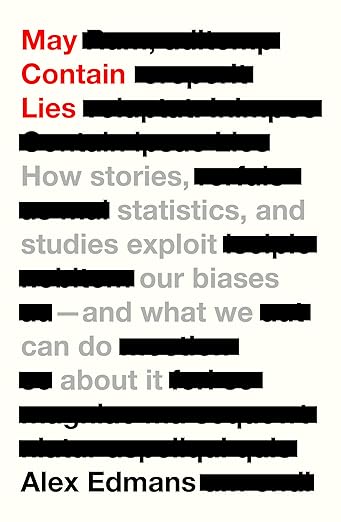Unpacking biases and defeating misinformation
Ever thought about how easy it is to manipulate cognitive biases? Here’s the reverse question: how can we remain vigilant and develop critical thinking in the age of misinformation? Alex Edmans tackles this question brilliantly in May Contain Lies, a provocative book that has grabbed attention and won over even the sharpest skeptics. It dives deep into the mechanics of information manipulation, offering guidance on how to navigate a world awash with questionable data.

May Contain Lies, by Alex Edmans, (Penguin Business, 2024)
#1 Cognitive biases
(in a nutshell)
Let’s take two common cognitive biases. The confirmation bias makes us more likely to accept information that aligns with our beliefs while ignoring what contradicts them.
Take, for example, the case of Belle Gibson, an Australian influencer who falsely claimed to have cured her cancer through natural remedies. Her story resonates because we’re drawn to inspiring narratives, often at the cost of verifying the facts
Source : Belle Gibson: The influencer who lied about having cancer, BBC
Binary thinking, on the other hand, traps us in rigid categories where everything is either good or bad, leaving no room for nuance. This reduces our ability to process complex information or see issues from multiple perspectives, especially when dealing with divisive topics like the death penalty.
Polarized opinions often amplify these biases, stifling rational debate. Without self-awareness, these two biases can rapidly distort our understanding of the world, making us more inclined to accept misinformation that confirms our preexisting beliefs.
© Copyright Business Digest - All rights reserved




